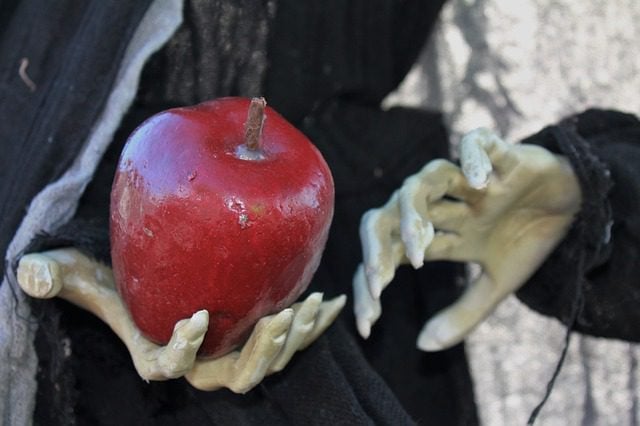
As predicted, I’ve gotten quite a bit of feedback on my post from yesterday about how the Harry Potter novels aren’t real. And most of it has been positive, but I’ve also gotten some feedback from people telling me I’m mistaken.
The arguments for Harry Potter actually being demonic seem to go like this: “the novel portrays the practice of magic as if it’s morally neutral. In real life, if you actually attempted to say a magic word to cause harm to someone, that’s a sin, and it might lead to demonic possession. The occult is real. The devil is real. You can’t be too careful. Fear is a virtue.”
I was raised in the Charismatic Renewal, where I heard this superstitious attitude repeated as if it had something to do with Catholicism. I saw how it caused anxiety and scruples rather than bringing about the Peace which surpasses all understanding.
This attitude is based on a good thing– we don’t want to do harm– and has some truth in it– the devil is real– but betrays a grave misunderstanding of Catholic teaching and of fiction. The Harry Potter series doesn’t portray practicing magic as morally neutral. It portrays a fictional world different from our own where magic is real and another kind of science, not involving evil spirits but manipulating the forces of nature in a different way. And in that fictional world, the practice of magic is governed by ethical rules just like any other science: using it in some ways is good or neutral, and using it in others is evil.
Yes, if here in the real world I pointed a magic wand at someone and said “crucio” intending to cause them excruciating pain, that would be a sin. It would also be wrong for me to point my pencil at someone and say “banana” if I honestly thought that doing so would hurt them. Putting curses on people is wrong. And doing nonsense things to people because you believe it will result in a curse is wrong too. You shouldn’t try to do a bad thing because you read about it in a storybook.
There are all kinds of things you shouldn’t do even though you read about them in a storybook. Mickey in The Night Kitchen jumps out of a plane naked, but you shouldn’t do that. Superman stops trains with his bare hands, but you shouldn’t do that. In The Lion, the Witch and the Wardrobe, Aslan sacrifices himself to the White Witch to appease the Deep Magic from the Dawn of Time and that’s a good thing. But if I decided to tie a cat to a stone slab and stab it to death to appease the Deep Magic from the Dawn of Time, I would be doing something evil.
Yes, I went there. I have found that people who are deeply immersed in the Satanic Panic often make an exception for Lewis and Tolkein because they were Christian and use a lot of Christian symbolism. But Harry Potter has plenty of symbolism derived from Christianity as well, believe it or not. Most fantasy does, especially what we think of as high fantasy, because it’s based on northern European myths and folktales which involve a mixture of northern European paganism and Christianity. And there you go– all fairy tales have “paganism” somewhere in them. If you believe all paganism is so evil that it will contaminate you if you so much as think about it, you’re going to be stuck reading Little House on the Prairie and nothing else.
Or you can accept that “paganism” is a term that just means “a religion other than one of the main world religions, specifically a non-Christian or pre-Christian religion.” And all kinds of people practice religions that may be called “pagan.” And some of the beliefs of people who are “pagan” match very well with Christian beliefs and some don’t. And it is harmless, all other things considered, to read fun stories about imaginary worlds where things out of pagan myth and a Christian worldview actually exist together. It’s also harmless to watch scary horror movies that pretend the world is remarkably different from what Christianity imagines. It’s harmless to roll dice and play a game where you make believe you’re a druid or a sorcerer on a quest. Because it’s a game, for fun, and it’s never been Catholic teaching that you could accidentally catch an evil spirit like a disease while not meaning to separate yourself from God.
It is Catholic teaching that evil spirits are real, and they take advantage of you when you choose to let them, through choosing to step away from God’s grace and do something evil. You could do that by pointing what you believed to be a magic wand at somebody and saying “crucio” if it wasn’t play but really meant to cause pain. You could stick pins in a voodoo doll with the intent to cause pain. You could also slap someone someone with the intent to cause pain. You could start an internet rumor about them with the intent to cause pain. Those are about the same. It’s intending to do evil when you ought to do good, and that’s sin, and that is of the Evil One, and you place yourself on the Evil One’s side when you do it. Nothing good can come from that.
Everyone is different, and nobody is perfect; we all have certain things that would be an occasion of sin for us and not for others. Most people can drink alcohol socially, and some can’t because they wouldn’t be able to stop and would do dangerous or abusive things under the influence of alcohol. Most people can go to a museum and appreciate a painting of a nude, but some can’t because they’re addicted to pornography and would not be able to appreciate such a thing as art; it would put them back in a pattern of objectifying people. Most people can read, watch and enjoy all kinds of fantasy with no problems at all. Some might find that they can’t because it makes them want to try out the curses and magic in real life, but I don’t think that’s a very large number of people.
If you happen to be a person who cannot read a fantasy story without practicing magic and giving yourself over to some kind of demonic influence– I’m sorry for you, and may God give you the strength to carry your cross. But you don’t have the right to tell the rest of us that we’re not allowed to have harmless fun on our own time. And it would be wrong of you to portray your particular sensitivity as the norm for the rest of the human race.
It would be especially wrong to try to induce fear and scrupulosity in people who are doing something harmless. That’s causing pain to people when we’re supposed to be kind to them, and therefore demonic.
He has not given us a spirit of fear. It’s okay to have fun.
(image via pixabay)
Steel Magnificat runs almost entirely on gratuities. To tip the author, go to our donate page here.












